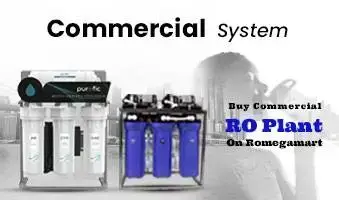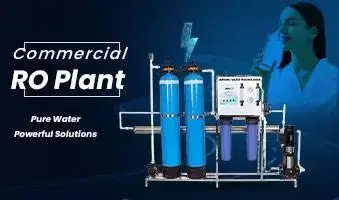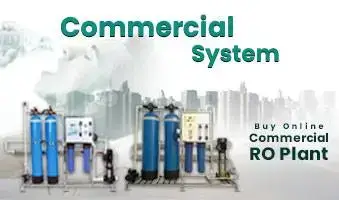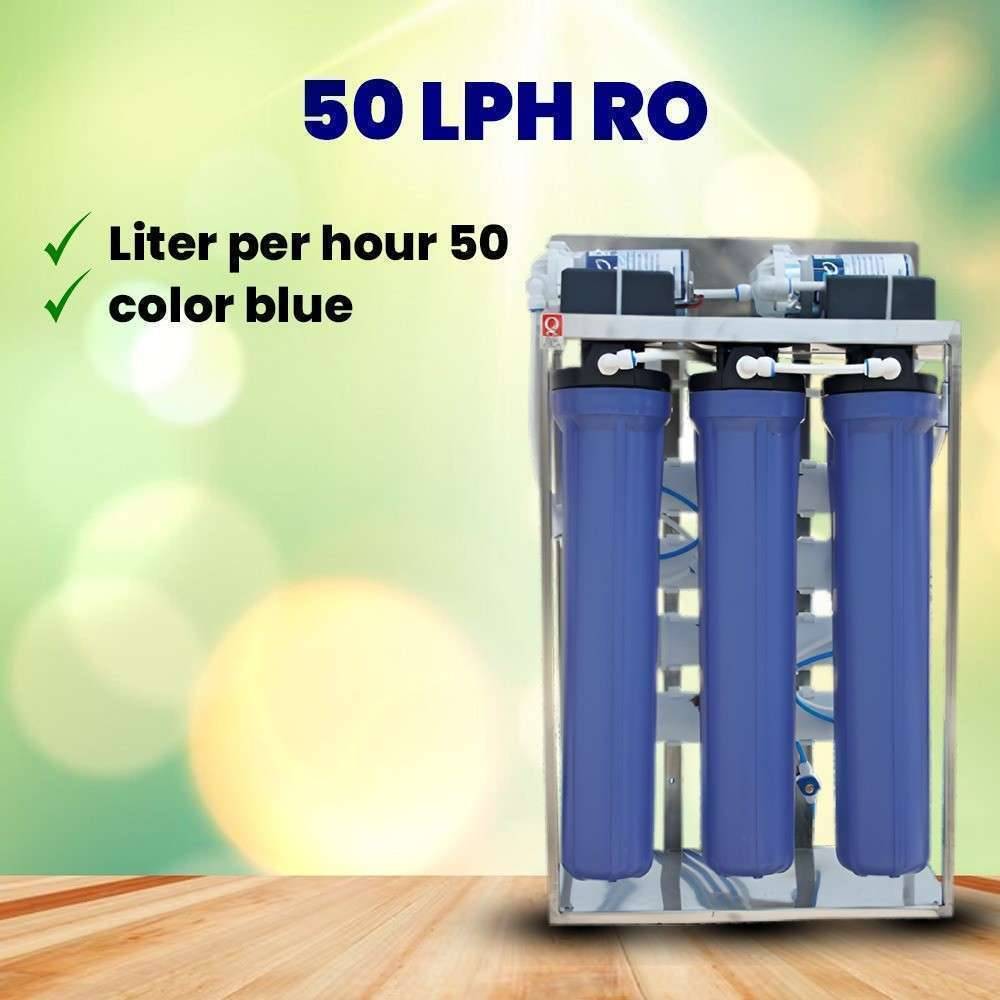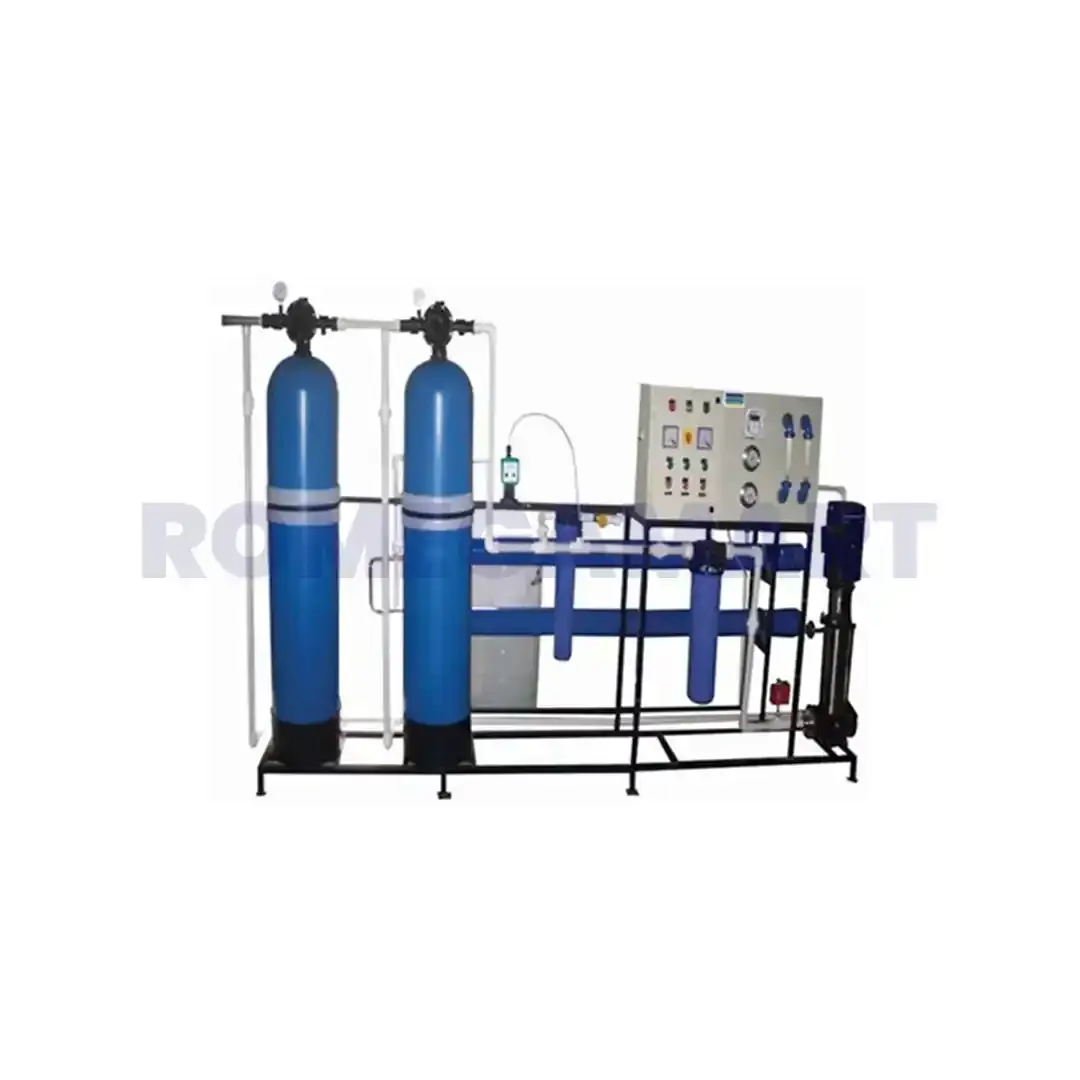Commercial RO Systems in West Bengal
Commercial Systems: Complete Information Guide for Commercial RO
Water Purifier Solutions
Access to pure and safe drinking water is a critical requirement for commercial establishments today. With increasing water pollution, rising TDS levels, and growing health awareness, Commercial RO Water Purifier Systems have become an essential infrastructure investment for businesses, institutions, and industrial operations.
Commercial Systems are specially designed RO water purification units that deliver high-output purified water continuously. These systems are engineered to operate for long hours, handle heavy workloads, and maintain consistent water quality under demanding conditions.
At Romegamart, we deal exclusively in RO water purifier solutions and provide a complete range of commercial RO systems from 25 LPH to 1000 LPH, including SS body systems, UV integrated systems, and customized configurations for different commercial needs.
What Are Commercial RO Water Purifier Systems?
Commercial RO systems are high-capacity water purification units that use Reverse Osmosis technology to remove dissolved salts, harmful contaminants, heavy metals, bacteria, and viruses from water. These systems are built with industrial-grade components, making them suitable for continuous operation and large-scale water consumption.
Unlike domestic RO purifiers, commercial systems:
-
Produce water in liters per hour (LPH)
-
Use heavy-duty pumps and membranes
-
Support continuous water supply
-
Are modular and upgradeable
-
Require structured installation and maintenance
Importance of Commercial RO Systems in Modern Infrastructure
Commercial establishments consume significantly more water than residential setups. The quality of water directly impacts:
-
Health and safety of users
-
Operational efficiency
-
Compliance with water standards
-
Brand reputation and trust
Commercial RO systems ensure that water supplied for drinking and food-related purposes is:
-
Chemically safe
-
Microbiologically pure
-
Consistent in taste
-
Suitable for long-term consumption
Working Principle of Commercial RO Systems
Commercial RO water purifiers follow a multi-stage purification process:
1. Raw Water Inlet
Water enters the system from borewell, tanker, or municipal supply.
2. Pre-Filtration Stage
Sediment filters remove sand, dust, rust, and suspended particles to protect internal components.
3. Carbon Filtration
Activated carbon filters eliminate chlorine, organic compounds, odor, and color.
4. RO Membrane Filtration
The RO membrane removes dissolved salts, heavy metals, fluoride, arsenic, nitrates, and harmful chemicals.
5. Optional UV Disinfection
UV systems kill bacteria, viruses, and microorganisms, ensuring biological safety.
6. Storage & Distribution
Purified water is stored in tanks and distributed through taps or pipelines.
Commercial RO Systems by Capacity – Detailed Information
🔹 25 LPH Commercial RO System
A 25 LPH RO system is designed to deliver 25 liters of purified water per hour. It is compact in size and operates with lower power consumption while maintaining consistent purification performance. This system is suitable for low to moderate water demand and can run continuously for several hours.
Key characteristics:
-
Compact structure
-
Single or dual membrane configuration
-
Low operating cost
-
Easy installation and maintenance
🔹 30 LPH Commercial RO System
The 30 LPH system provides slightly higher output than 25 LPH systems and is built to manage moderate daily consumption. It ensures stable pressure, efficient filtration, and continuous water availability during working hours.
Key characteristics:
-
Improved flow rate
-
Better recovery rate
-
Heavy-duty pump support
-
Reliable filtration performance
🔹 50 LPH Commercial RO System
A 50 LPH RO system is one of the most widely used commercial capacities. It balances performance and cost effectively, making it suitable for continuous usage environments. The system can be configured with multiple pre-filters for enhanced water quality.
Key characteristics:
-
Higher purification efficiency
-
Stable output for daily use
-
Supports extended operational hours
-
Easy serviceability
🔹 60 LPH Commercial RO System
The 60 LPH RO system is engineered for higher water output with consistent pressure. It can support multiple dispensing points and offers reliable performance under varying water quality conditions.
Key characteristics:
-
Enhanced membrane performance
-
Strong pump capacity
-
Continuous supply capability
-
Durable frame design
🔹 100 LPH Commercial RO System
100 LPH RO systems are built for heavy daily water requirements. These systems use high-efficiency membranes and pumps to deliver purified water without interruptions. They are suitable for continuous multi-shift usage.
Key characteristics:
-
High production rate
-
Industrial-grade components
-
Advanced filtration stages
-
Long operational life
🔹 120 LPH Commercial RO System
A 120 LPH RO system offers higher throughput with optimized energy consumption. It is designed to maintain consistent water quality even under fluctuating input water conditions.
Key characteristics:
-
Higher flow stability
-
Robust mechanical design
-
Efficient membrane recovery
-
Supports long-term operations
🔹 150 LPH Commercial RO System
150 LPH systems are engineered for demanding environments where an uninterrupted water supply is essential. These systems can be integrated with storage tanks and distribution lines.
Key characteristics:
-
Continuous duty cycle
-
High-pressure pump
-
Multiple membrane housing options
-
Easy scalability
🔹 200 LPH Commercial RO System
200 LPH RO systems are designed for high-volume water consumption and extended operation. These systems are suitable for centralized water purification setups.
Key characteristics:
-
Industrial-grade frame
-
Advanced filtration configuration
-
Consistent output rate
-
High durability
🔹 250 LPH Commercial RO System
250 LPH RO systems are heavy-duty units capable of handling large-scale purification needs. These systems are often installed in facilities with high daily water demand.
Key characteristics:
-
Strong membrane performance
-
Heavy-duty motor and pump
-
Supports long operating hours
-
Customizable design
🔹 500 LPH Commercial RO System
500 LPH RO systems are large-capacity purification units designed for centralized water supply. They require proper pre-treatment and structured installation for optimal performance.
Key characteristics:
-
High flow capacity
-
Industrial membranes
-
Advanced automation options
-
Continuous operation capability
🔹 750 LPH Commercial RO System
750 LPH systems deliver very high output and are used where water demand is constant throughout the day. These systems require robust infrastructure support.
Key characteristics:
-
Multi-membrane configuration
-
Heavy-duty electrical components
-
High recovery efficiency
-
Stable output under load
🔹 1000 LPH Commercial RO System
1000 LPH RO systems represent large-scale commercial water purification. These systems are built for non-stop operation and require professional installation and maintenance.
Key characteristics:
-
Maximum output capacity
-
Industrial automation support
-
Long membrane life
-
High operational efficiency
Stainless Steel (SS) Commercial RO Systems
SS RO systems are constructed using food-grade stainless steel, making them suitable for hygiene-sensitive environments.
250 LPH SS RO System
500 LPH SS RO System
1000 LPH SS RO System
Advantages of SS systems:
-
Corrosion resistance
-
Long service life
-
Easy cleaning
-
Hygienic construction
Commercial RO Systems with UV Technology
UV-integrated commercial RO systems provide an additional layer of biological protection.
100 LPH UV RO System
250 LPH UV RO System
500 LPH UV RO System
UV advantages:
-
Kills bacteria and viruses
-
Enhances microbiological safety
-
Suitable for sensitive applications
Benefits of Commercial RO Systems
-
High-volume water purification
-
Consistent water quality
-
Reduced dependency on bottled water
-
Long-term cost savings
-
Reliable performance
-
Scalable solutions
Why Buy Commercial RO Systems from Romegamart?
Romegamart is a dedicated B2B marketplace for RO water purifiers.
✔ Complete range of commercial RO systems
✔ Verified sellers and manufacturers
✔ Wholesale pricing advantage
✔ Multiple capacity options
✔ Pan-India supply network
✔ Dealer & distributor-friendly platform
Conclusion
Commercial RO water purifier systems are essential for maintaining safe and reliable drinking water in commercial environments. With capacities ranging from 25 LPH to 1000 LPH, including SS and UV variants, these systems ensure uninterrupted purification and long-term performance.
Romegamart provides a one-stop solution for commercial RO systems, helping businesses, dealers, and distributors access high-quality purification systems with confidence.



